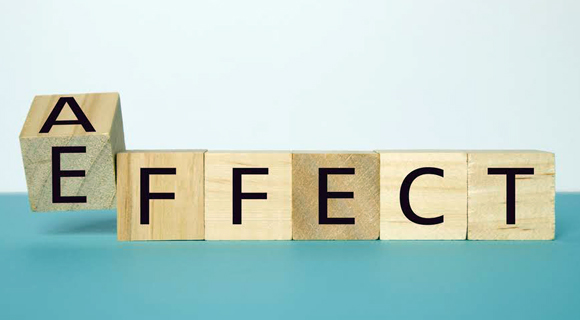The similarities between “affect” and “effect” can be tricky for writers. We’ll explore their meaning tips for using them correctly.
For centuries, the distinction between “affect” and “effect” has posed a grammatical challenge, leading even the most seasoned writers to make mistakes. Although these words sound alike and are frequently used in similar contexts, each serves a distinct and vital role in English.
What is your English level?
Find out your A1 A2 B1 B2 C1 C2 level of English with our quick, free online test.
Understanding “affect” and “effect”
Affect and effect are often confused. In most cases, affect functions as a verb, indicating influence or the creation of change, though it has less common uses as both a verb and a noun. Conversely, effect is typically a noun, representing the outcome of a change, but it can also function as a verb, signifying the initiation of a particular change.The words “affect” and “effect” are easily confused because their pronunciation is almost identical, and their meanings are closely related as well. So, let’s begin by clarifying what each word means and exploring some examples of their use in context.
Affect
Part of speech: Verb
Definition: To influence, produce a change in, or impact something
Examples:
- The weather can affect your mood.
- Her speech affected the audience deeply.
Effect
Part of speech: Noun
Definition: The result or outcome of a particular action or event
Examples:
- The effect of the music on the audience was profound.
- Meditation has positive effects on mental health.

Common errors when using “affect” vs. “effect”
Though it’s common to mix up these words, using them accurately is crucial for creating clear and coherent texts and establishing credibility in your writing. We’ll go over common mistakes to help you avoid errors when using these words.
Mixing up the words
The primary mistake involves confusing the two terms, a mistake that can occur effortlessly when our minds operate automatically, even when we understand the distinct meanings of each word. Here’s an example illustrating both correct and incorrect usage.
Correct: The change will affect me.
Incorrect: The change will effect me.
Correct: The moon has an effect on the sea’s tides.
Incorrect: The moon has an affect on the sea’s tides.
Using the adjective form of the words
The second most prevalent error pertains to the adjective forms of these words: “affective” and “effective.” We’ve provided definitions for both to aid in clarifying their proper usage.
Affective
Part of speech: Adjective
Definition: Relating to moods, feelings, and attitudes
Example: The patient has an affective disorder.
Effective
Part of speech: Adjective
Definition: Successful in producing a desired or intended result
Example: They found an effective solution to the problem.
Are you C1 Advanced English?
Get your C1 Advanced English certificate now!
✓ Add your certificate to your resume
⭐ ⭐ ⭐ ⭐ ⭐
Practical tips for using “affect” vs. “effect”
Now that you know what “affect” and “effect” mean and what common mistakes to look out for, we can move on to some helpful tips for using them correctly.
Learn the definitions of the words
Predictably, the more familiar you are with the definitions of these words, the higher the likelihood of using them accurately. Create two flashcards, with “affect” and “effect” on the front and their respective definitions on the back.
Start by reviewing the definitions and attempting to memorize each word. Once you feel comfortable, read the words and test your recall of the definitions. Grasping these definitions will assist you in verifying your sentences to guarantee that the chosen word conveys the correct meaning.
Check your sentence structure
You can often communicate the same information using either “affect” or “effect” by adjusting the sentence structure to emphasize the action of influencing something (“affect”) or the outcome of the influence (“effect”). This can create confusion about which word to use.
To select the appropriate word, analyze the structure of your sentence and determine whether it necessitates a verb or a noun. Consider the example: “The moon […] the tides.” In this case, there’s a subject (the moon) and an object (the tides) but no verb, indicating the need for “affects.”
If you find it challenging to recall which word is the verb and which is the noun, you can use the mnemonic acronym RAVEN:
Remember
Affect
Verb
Effect
Noun

Conclusion
We’ve examined the distinction between “affect” and “effect,” examined common errors, and delved into tips for creating precise and credible written pieces. Armed with this knowledge, you’re prepared to hone your skills in using these crucial words until they become ingrained.
The English language poses various challenges, but your engagement with this article demonstrates the curiosity and commitment necessary for mastering them. Continue your commendable efforts by exploring more of our vocabulary articles, encompassing topics ranging from “to” vs. “too” to gym-related vocabulary.
What is your English level?
Find out your A1 A2 B1 B2 C1 C2 level of English with our quick, free online test.





